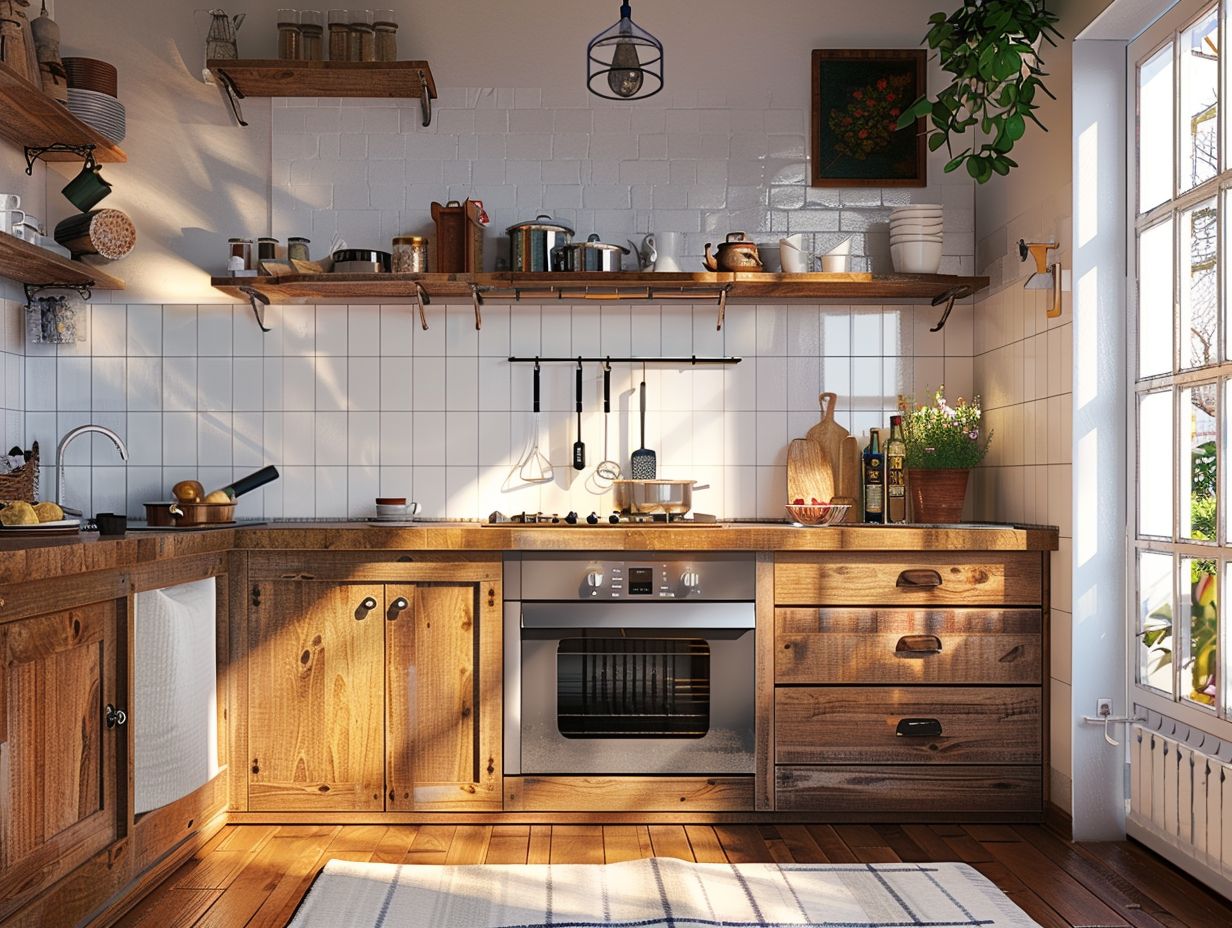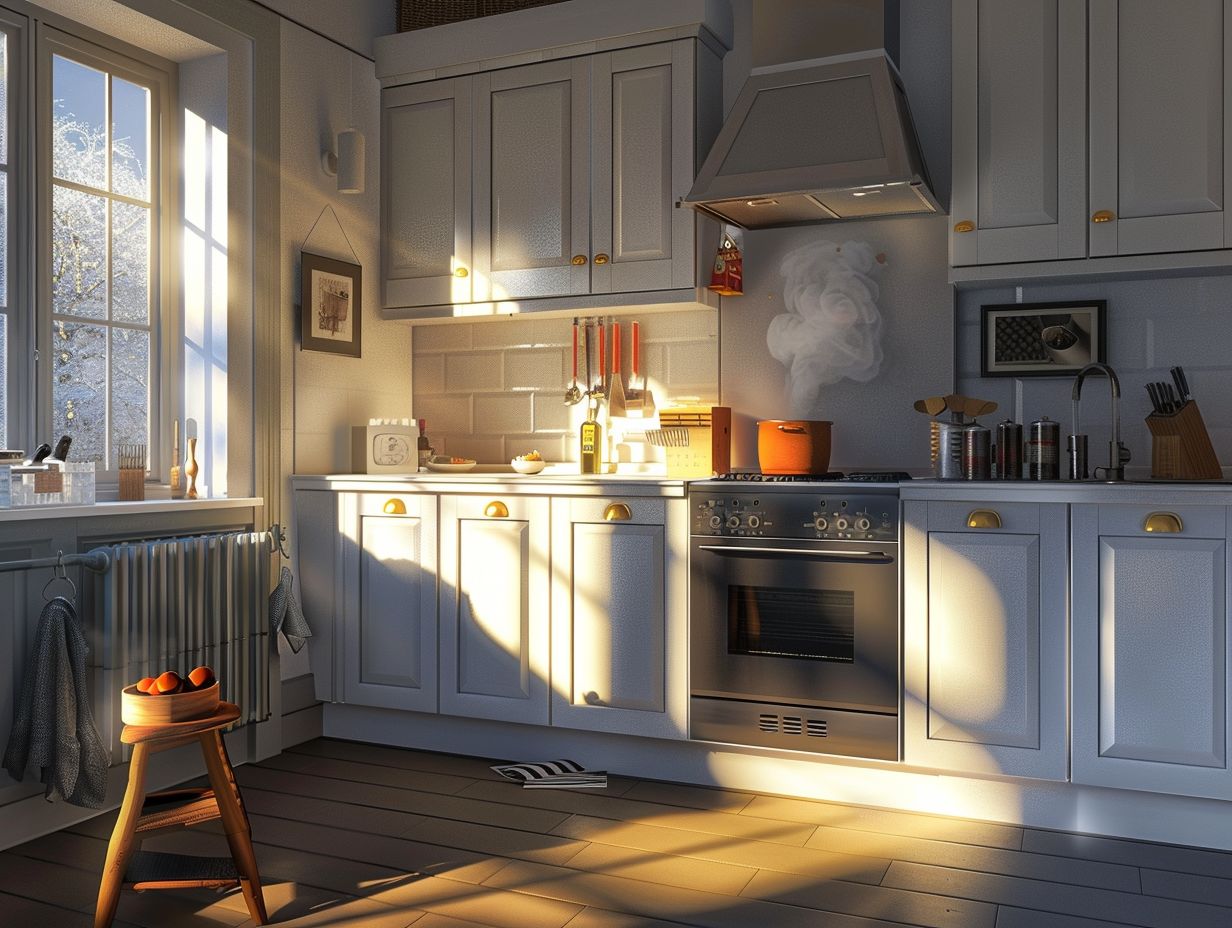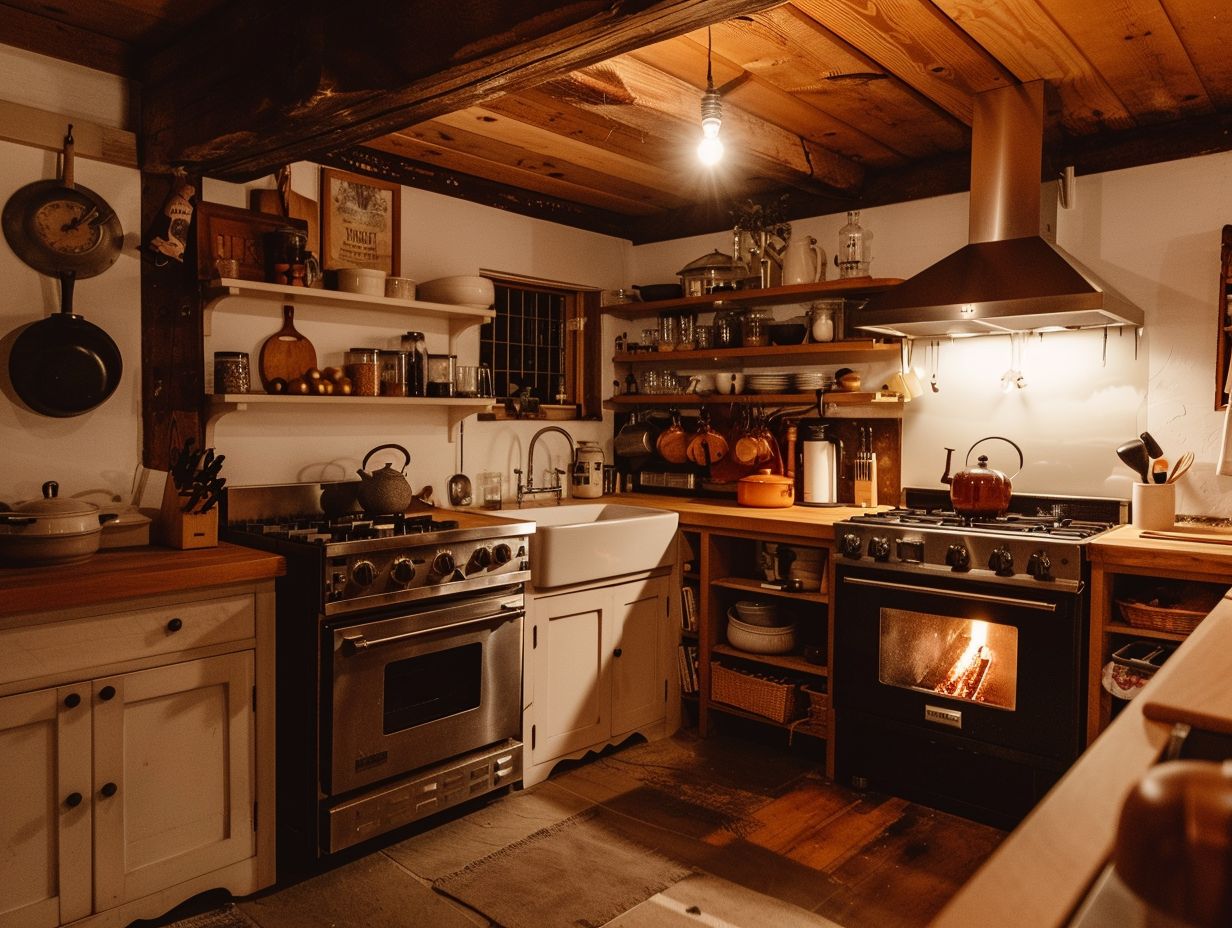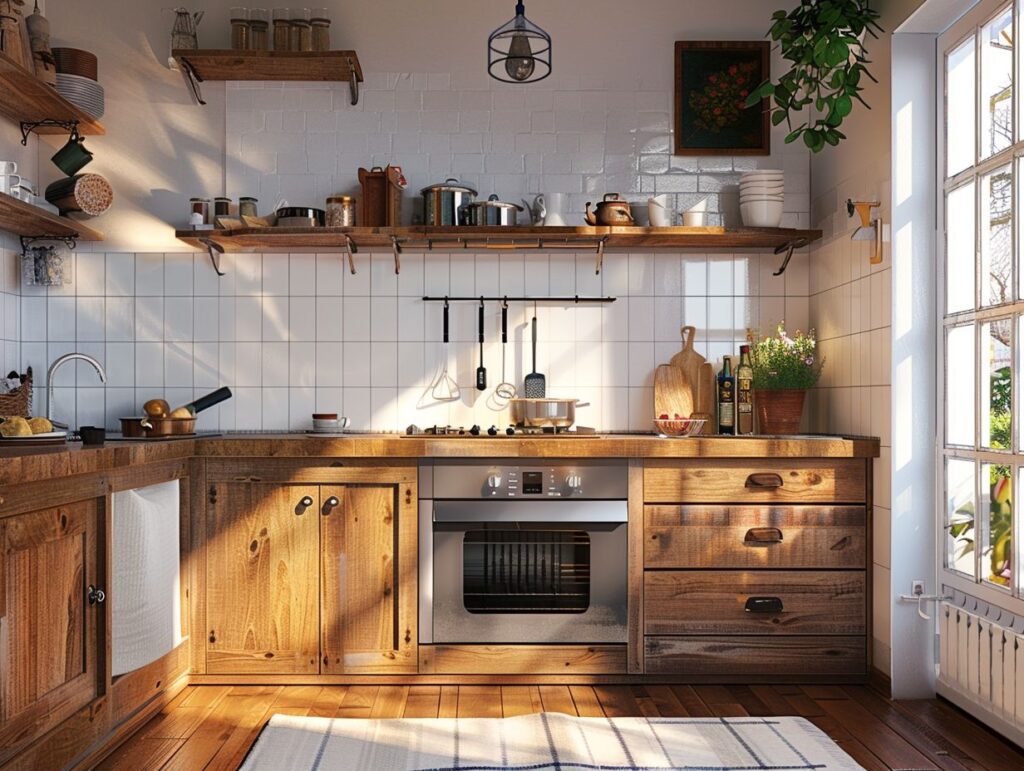Do you find yourself entering a chilly kitchen each morning? Are you struggling to stay warm while cooking during the winter season? If these situations sound familiar, it may be beneficial for you to explore the value of installing a kitchen heater.
In the following discussion, we will explore the benefits of having a heater in your kitchen, the various types of kitchen heaters on the market, important factors to take into account when selecting one, and the installation and maintenance procedures involved.
By understanding how a kitchen heater can enhance comfort, conserve energy, and contribute to a positive environmental footprint, you can make an informed decision about integrating this heating solution into your kitchen environment.
Key Takeaways:

- Installing a heater in your kitchen offers numerous advantages, including improved comfort and energy savings.
- When choosing a kitchen heater, consider factors such as size, power requirements, budget, and energy efficiency.
- Professional installation and regular maintenance are important for ensuring the effectiveness and longevity of your kitchen heater.
The Importance of a Kitchen Heater
A kitchen heater plays an essential role in any household, offering warmth and comfort while enhancing the overall design and functionality of the area. Selecting the right heating solution is crucial in turning your kitchen into a cosy and welcoming space for both cooking and socialising.
To ensure an effective distribution of heat throughout your kitchen, it is important for homeowners to carefully choose the type of heater and its placement.
Factors such as insulation, window positioning, and cabinet layout can influence the efficiency of the heating system, impacting energy conservation and overall warmth.
The layout of your kitchen, whether it is open-plan, galley, or L-shaped, may require specific heating options like underfloor heating, radiant panels, or traditional radiators tailored to fit the space and optimise comfort.
Consider these design choices to create a comfortable environment for meal preparation and gatherings.
Advantages of Having a Heater in the Kitchen
Having a heater in your kitchen offers numerous benefits, including efficient heating of the space, improved comfort during cooking and meal preparation, and enhanced design options for a stylish and functional culinary area.
Kitchen heaters not only help in maintaining a consistent and comfortable temperature while preparing meals, but they also contribute to energy efficiency by allowing targeted heating in specific areas.
This targeted approach can help reduce overall heating costs by focusing on the areas where warmth is needed most. Modern kitchen heaters come in a variety of designs and styles, ranging from sleek under-cabinet models to elegant wall-mounted options, adding a touch of sophistication to the kitchen decor while serving their practical purpose.
Types of Kitchen Heaters
Regarding kitchen heaters, you have a range of options to consider, each with its unique advantages and design implications. From traditional radiators to contemporary underfloor heating systems, there are diverse choices available to accommodate various kitchen layouts and heating demands.
Traditional radiators have been a longstanding feature in kitchens, offering efficient heat distribution through convection. They come in a variety of sizes and styles to complement different décor preferences.
On the other hand, underfloor heating systems provide a more discreet and uniformly distributed heat source, making them ideal for open-plan kitchens or spaces with limited wall area. With underfloor heating, you can experience the comfort of warm floors and a cosy ambiance without the presence of visible radiators.
Each option presents its own strengths, so it is crucial to select the one that aligns with your kitchen layout and heating needs.
Electric vs Gas Heaters
When you are deciding between electric and gas heaters for your kitchen, you will need to consider various factors like energy efficiency, heat output, and installation costs.
Electric heaters are known for their convenience and precise control, while gas heaters are recognised for their cost-effectiveness and consistent warmth.
Electric heaters are preferred for their quick heating capabilities, providing instant warmth that is ideal for smaller kitchen spaces requiring rapid heating.
On the other hand, gas heaters are often chosen by individuals seeking to lower energy costs, as natural gas tends to be more economical than electricity in many areas.
In terms of installation, electric heaters are generally easier to set up as they only require a power source. In contrast, gas heaters necessitate proper ventilation and gas line connections to ensure safe operation.
Underfloor Heating vs Radiators

When deciding between underfloor heating and radiators in your kitchen, consider factors such as available floor space, desired heat distribution, and overall design preferences. Underfloor heating offers a luxurious warmth that emanates from the ground up, while radiators provide focused spot heating and various stylish design options.
Underfloor heating is recognised for its ability to maintain a consistent temperature throughout the entire room, making it an attractive option for larger kitchen areas. Conversely, radiators may result in uneven heating, particularly in areas further away from the heat source.
In terms of comfort, underfloor heating eliminates the need for bulky radiators, allowing for more design flexibility and freeing up wall space. While the initial installation costs for underfloor heating may be higher compared to radiators, the latter are generally simpler and quicker to set up.
Factors to Consider When Choosing a Kitchen Heater
When selecting the right kitchen heater, you need to carefully consider factors such as the size of the space, power requirements, budget constraints, and energy efficiency goals. By weighing these aspects, you can choose a heating solution that best suits your needs and lifestyle.
When determining the size requirements for a kitchen heater, it is essential to measure the square footage of the room to ensure proper coverage.
Power considerations revolve around deciding between electric heaters, which are often more convenient, or gas-powered options for those seeking higher power output.
Budget constraints play a significant role in selecting a kitchen heater, as various models come with different price tags and operating costs. Focusing on energy efficiency goals can help reduce long-term expenses and minimise environmental impact by opting for energy-efficient heating solutions.
Size and Power Requirements
When determining the appropriate size and power requirements for a kitchen heater, you must consider various factors to achieve optimal heating performance and energy efficiency.
Room dimensions, insulation levels, and desired warmth levels are critical considerations in selecting the most suitable heating solution for your kitchen.
The size of the room directly affects the distribution of heat within the space. A larger kitchen may necessitate a heater with higher wattage to ensure effective heating in all areas. Additionally, the quality of insulation in the room impacts heat retention, which in turn influences the size of the heater required.
It is essential to understand your heating preferences, whether you prefer constant warmth or quick bursts of heat. This knowledge is crucial when deciding between different types of heaters, such as convection, radiant, or fan-forced heaters.
By taking these factors into account, you can ensure not only comfort but also cost-effective and sustainable heating solutions for your kitchen.
Budget and Energy Efficiency
When selecting a kitchen heater, you should carefully balance budget constraints with energy efficiency goals. It is important to seek out cost-effective solutions that provide long-term savings through efficient heating performance and decreased energy consumption.
To make informed decisions, homeowners should evaluate the long-term financial implications of various heating options.
Opting for energy-efficient models can lead to reduced utility bills and lower carbon emissions, thereby supporting a more environmentally friendly household. By investing in a kitchen heater that prioritises energy efficiency, you can create a comfortable living space while also promoting eco-friendly practices and achieving cost savings.
Therefore, it is crucial to strike a balance between initial investment costs and the ongoing benefits of energy efficiency when choosing the right kitchen heater.
Installation and Maintenance of Kitchen Heaters
Ensuring proper installation and maintenance of your kitchen heaters is crucial for maximising performance and longevity. Whether you opt for professional installation or choose the DIY route, following maintenance guidelines is essential to ensure your heating system operates efficiently.
Professional installation of kitchen heaters offers numerous benefits compared to DIY methods. Professional installers possess the expertise and knowledge to place the heater correctly, secure connections, and adhere to safety protocols.
Additionally, professional installations often include warranties, providing homeowners with peace of mind.
If you decide to take the DIY approach, it is imperative to carefully read and adhere to the manufacturer’s instructions to avoid costly errors.
Regular maintenance tasks, such as cleaning filters, inspecting for leaks, and checking for wear and tear, are critical for maintaining optimal heating efficiency and preventing breakdowns.
Professional Installation vs DIY

When deciding between professional installation and DIY for kitchen heaters, you must consider factors such as system complexity, personal expertise, and budget. Opting for professional installation ensures precision and adherence to regulations, while DIY methods can be a budget-friendly choice for homeowners with the necessary skills.
Professional installation provides the reassurance that the system is installed correctly, minimising the risk of errors.
This is especially beneficial for individuals who lack experience in working with electrical components or intricate installations. On the contrary, DIY approaches necessitate a certain level of expertise to execute effectively, as improper installation could result in safety risks or dysfunctional units.
In terms of cost, while professional services may require a higher upfront cost, they could result in long-term savings by preventing potential damages or the need for expensive repairs.
Tips for Proper Maintenance
To extend the lifespan and efficiency of your kitchen heaters, regular maintenance is crucial. Homeowners should schedule annual inspections, clean filters, and check for leaks to ensure that the heating system functions optimally throughout the year.
Plus these routine tasks, it is important for you to proactively troubleshoot common issues that may arise with your kitchen heater. Be attentive to any unusual noises, fluctuations in temperature, or sudden increases in energy consumption, as these could be indicators of underlying problems.
If you observe any of these signs, it is advisable to address them promptly to prevent further damage and uphold the functionality of your heating system.
By remaining vigilant and taking these simple steps, you can guarantee that your kitchen heater stays in top condition, offering you warmth and comfort precisely when you need it the most.
Benefits of Having a Heater in Your Kitchen
Having a heater in your kitchen offers a range of benefits, such as increased comfort and convenience during meal preparation, energy savings, and a reduced environmental impact. A well-heated kitchen helps create a welcoming atmosphere for both residents and guests.
The warmth generated by a kitchen heater not only makes cooking tasks more comfortable but also contributes to a cosy ambiance that encourages enjoyable gatherings and social interactions.
Modern heating solutions are designed with energy efficiency in mind, aiming to lower utility costs and reduce the carbon footprint associated with home heating systems.
By investing in an efficient heater for your kitchen, you not only enhance daily comfort but also align with environmentally conscious practices that promote sustainable living.
Improved Comfort and Convenience
Having a well-heated kitchen enhances comfort and convenience for you as the occupant, providing a cosy environment for cooking, dining, and socialising. Efficient heating solutions enable you to enjoy a pleasant culinary experience throughout the year.
By having a heater in your kitchen, you can maintain an optimal temperature while also fostering a welcoming atmosphere that encourages creativity and productivity.
A warm and inviting space allows you to engage in culinary experiments, gather for meals with loved ones, or simply unwind after a long day. The consistent warmth provided by a reliable heating system ensures that your kitchen remains a hub of activity, promoting a sense of contentment and well-being.
Energy Savings and Environmental Impact
Opting for energy-efficient kitchen heaters not only leads to cost savings but also reduces the environmental impact of heating systems. By choosing sustainable heating solutions, you can lower your carbon footprint and contribute to a greener living environment.
Efficient kitchen heaters are designed to maximise energy usage, ensuring that heat is distributed evenly throughout the space without unnecessary waste. This targeted approach not only results in a more comfortable cooking environment but also reduces overall energy consumption.
Plus cost savings on utility bills, eco-friendly heating choices promote a healthier planet by decreasing greenhouse gas emissions and reliance on non-renewable energy sources. Making the switch to energy-efficient kitchen heaters is a practical step towards creating a more sustainable and environmentally conscious household.
Frequently Asked Questions

What are the benefits of installing a heater in my kitchen?
Installing a heater in your kitchen can provide you with a more comfortable and enjoyable cooking experience. It can also help to keep your kitchen space warm and cozy during colder months.
Will a heater in my kitchen help to lower my energy bills?
Yes, a heater can help to lower your energy bills by providing targeted warmth to your kitchen, reducing the need to heat the entire house. This can result in cost savings on your monthly energy expenses.
What type of heater is best for a kitchen?
There are different types of heaters that can work well in a kitchen, such as a convection heater, a radiant heater, or a portable space heater. Consider factors such as the size of your kitchen, safety features, and energy efficiency when choosing the best type of heater for your space.
Can a kitchen heater also function as a ventilation system?
Some kitchen heaters, such as range hood heaters, can also function as a ventilation system by removing smoke, steam, and odors from your kitchen. This can help to keep your kitchen clean and free of unwanted smells.
Do I need to hire a professional to install a kitchen heater?
It is recommended to hire a professional to install a kitchen heater, especially if it requires electrical or plumbing work. This will ensure that the heater is properly and safely installed, and can also help to avoid any potential issues or damages.
Are there any safety precautions I should take when using a kitchen heater?
Yes, it is important to always follow the manufacturer’s instructions and safety guidelines when using a kitchen heater. Keep flammable materials away from the heater and do not leave it unattended while in use. It is also recommended to have a fire extinguisher nearby in case of emergencies.

